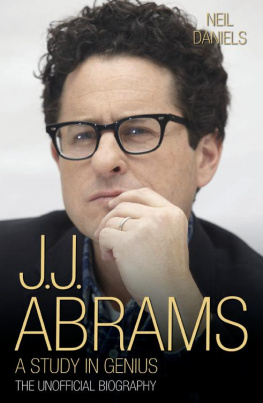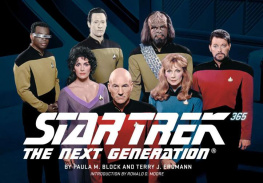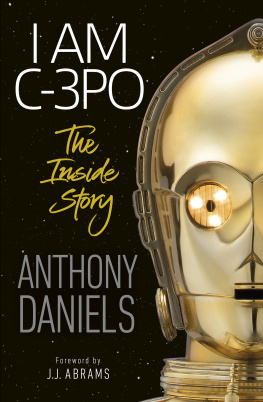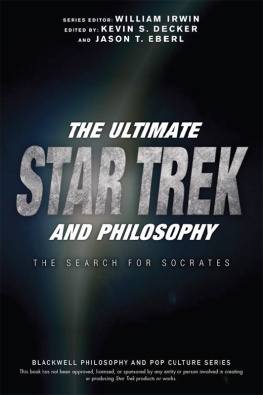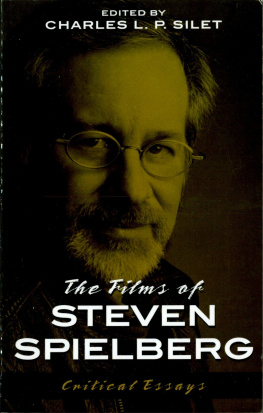The Philosophy of J. J. Abrams
THE PHILOSOPHY OF
J. J. ABRAMS
Edited by
PATRICIA BRACE
and
ROBERT ARP

Due to variations in the technical specifications of different electronic
reading devices, some elements of this ebook may not appear
as they do in the print edition. Readers are encouraged
to experiment with user settings for optimum results.
Copyright 2014 by The University Press of Kentucky
Scholarly publisher for the Commonwealth,
serving Bellarmine University, Berea College, Centre College of Kentucky, Eastern Kentucky University, The Filson Historical Society, Georgetown College, Kentucky Historical Society, Kentucky State University, Morehead State University, Murray State University, Northern Kentucky University, Transylvania University, University of Kentucky, University of Louisville, and Western Kentucky University.
All rights reserved.
Editorial and Sales Offices: The University Press of Kentucky
663 South Limestone Street, Lexington, Kentucky 40508-4008
www.kentuckypress.com
Library of Congress Cataloging-in-Publication Data
The philosophy of J. J. Abrams / edited by Patricia Brace and Robert Arp.
pages cm
Includes bibliographical references and index.
ISBN 978-0-8131-4530-3 (hardcover : alk. paper)
ISBN 978-0-8131-4534-1 (pdf) ISBN 978-0-8131-4533-4 (epub)
1. Abrams, J. J. (Jeffrey Jacob), 1966Criticism and interpretation. I. Brace, Patricia, 1960 editor of compilation. II. Arp, Robert, editor of compilation.
PN1998.3.A27P55 2014
791.43023092dc23 | 2014006363 |
This book is printed on acid-free paper meeting the requirements of the American National Standard for Permanence in Paper for Printed Library Materials.

Manufactured in the United States of America.

| Member of the Association of
American University Presses |
CONTENTS
Patricia Brace and Robert Arp
A. P. Taylor and Justin Donhauser
Franklin Allaire
Cynthia Jones
Ashley Barkman
Jerry S. Piven and Jeffrey E. Stephenson
Adam Barkman
Phil Smolenski and Charlene Elsby
Jason T. Eberl
Randall E. Auxier
Joseph J. Foy
Charles Taliaferro and Emilie Judge-Becker
Brendan Shea
Daniel Whiting
Vishal Garg
Elly Vintiadis and Spyros D. Petrounakos
Andrew Fyfe
Paul DiRado
Jeff Ewing
Robert Arp and Patricia Brace
Jeff Ewing
Michael Versteeg and Adam Barkman
INTRODUCTION
Patricia Brace and Robert Arp
American auteur Jeffrey Jacob J. J. Abrams has a knack for creating the kind of twisty, densely plotted TV series and films that keep us on the edge of our seats and begging for more. His particular genius seems to be in the way he combines geek appeal and broader commercial and critical successes in TV shows like Felicity, Emmy-nominated Alias, Emmy- and Golden Globewinning Lost, the critically acclaimed Fringe, and films such as the Godzilla-inspired Cloverfield, the reboot of the Star Trek franchise, and his Spielbergian ode to the late 1970s, Super 8. As writer, director, producer, and even composer, he puts his particular stamp on everything he touchesa stamp that at times is rife with philosophical themes. His name on a project promises that your heart, mind, and sometimes even your soul will get a workout.
The Philosophy of J. J. Abrams is a collection of chapters by thinkers highlighting the philosophical insights present in Abramss television and film work. Using Abramss works as a touchstone, the book leads the reader through some basic concepts in philosophy, making it useful for an introductory philosophy course, but it also contains enough content on Abramss individual works to satisfy his fans, media and popular culture students, film students, and people who would like to dabble in a little philosophy.
Philosophical themes may be found throughout Abramss continuingly popular works. As cocreator of Lost, Abrams melded the popularity of the reality show Survivor to the twisted concept of a living island with incredible monsters and a fascinating set of charactersmany of them named for famous philosopherswhose interactions take place in the past, present, and future via flashbacks and flash-forwards. And if that wasnt enough, in the final season we got flash-sideways into alternate pasts, presents, and futures! If any show contains philosophical analysis, it is this one. Man of science or man of faith? Nature vs. nurture? Live together or die alone? The Island could be seen as a heavenly tabula rasaor was it purgatory, or even hell? Would we ever get any answers to the shows many mysteries?
Continuing his pattern of having an overarching mystery move the action of a television story, Abrams next took on Fringe, with its Pattern mythology slowly revealed as we learned more about the heroes of the piece. As with his other works, relationships are central; in this case, those caught in the orbit of the unconventional and at times quite mad Dr. Walter Bishop, whose highly unethical medical experiments on young children allowed him and his partner, William Bell (played by Leonard Nimoy), to find and eventually travel to a second Earth. When Walters son, Peter, died as a child, the grieving father kidnapped his doppelganger from the other Earthwhat parent wouldnt at least contemplate it? That Peter grows up ignorant of his true origins and estranged from his father (who has gone slowly mad and been institutionalized) is just the sort of poignant irony Abramss work celebrates.
Abramss film work champions the ability of ordinary people to undergo transformation and become, in their own ways, heroic. In Armageddon the least likely guys, a bunch of rough oil drillers, face their fear of death and save the world. On a more personal level, his script for Regarding Henry uses a sort of reverse flashback technique to show how a damaged man regains his simple humanity. In the wrong place at the wrong time (another common problem for Abramss heroes), Henry is shot in the head and loses his memory. His struggles to refill his blank slate reveal a portrait of a hard-driving, unethical corporate lawyer who was estranged from his family, having an affair, and ignoring his wife and child. It turns out that the damage was not the gunshot; that bullet to the brain was his salvation or a reset, bringing him into accord with his true ethical and familial center.
This resetting of reality is found in most of Abramss work (in television, we see how 9/11 played out in two different ways on Fringe as well as seeing the alternate worlds on the final seasons of Felicity and Lost and Sydneys missing three years on Alias) and most recently in his big-screen version of the classic Star Trek. Again, a framing device provides continuity for the pieceMr. Spock, long retired from Starfleet, has lived among the Romulans for decades, working to reunite them with their ancestors, the Vulcans. When catastrophe looms, his efforts to save their planet fall short and set into motion a series of events that will throw him back into his own past, forever altering or perhaps
Next page

